EXHIBIT 99.2
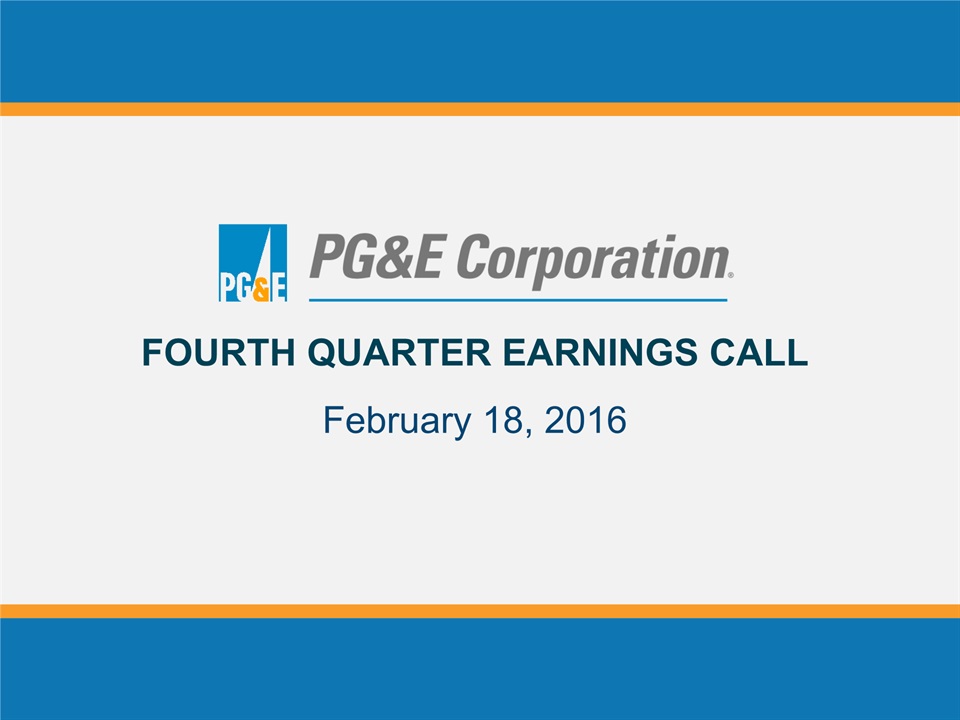
FOURTH QUARTER EARNINGS CALL February 18, 2016
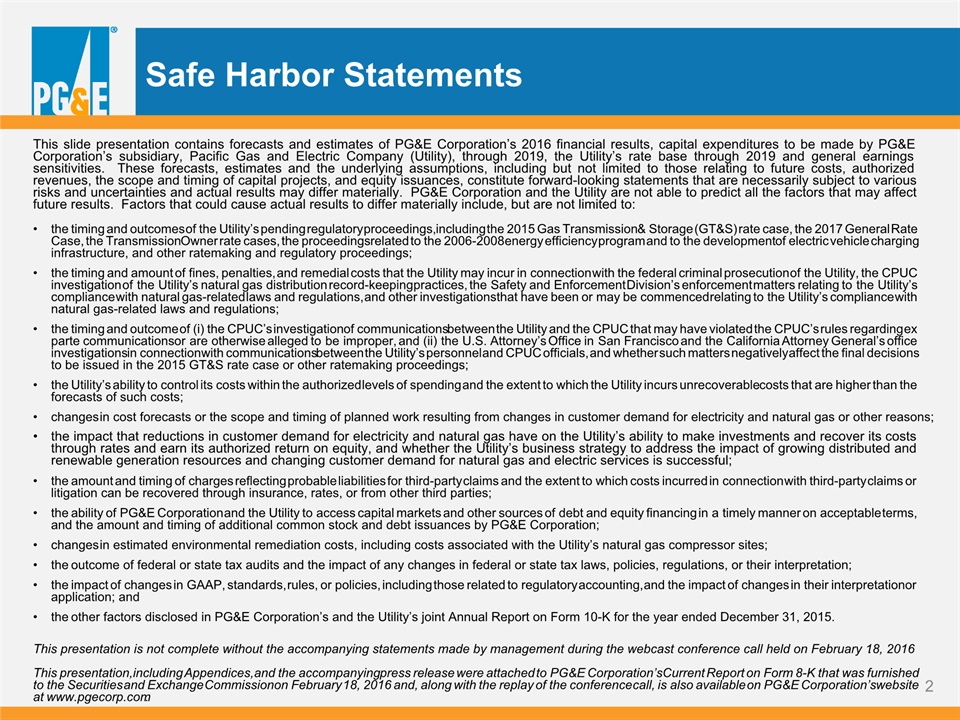
Safe Harbor Statements This slide presentation contains forecasts and estimates of PG&E Corporation’s 2016 financial results, capital expenditures to be made by PG&E Corporation’s subsidiary, Pacific Gas and Electric Company (Utility), through 2019, the Utility’s rate base through 2019 and general earnings sensitivities. These forecasts, estimates and the underlying assumptions, including but not limited to those relating to future costs, authorized revenues, the scope and timing of capital projects, and equity issuances, constitute forward-looking statements that are necessarily subject to various risks and uncertainties and actual results may differ materially. PG&E Corporation and the Utility are not able to predict all the factors that may affect future results. Factors that could cause actual results to differ materially include, but are not limited to:the timing and outcomes of the Utility’s pending regulatory proceedings, including the 2015 Gas Transmission & Storage (GT&S) rate case, the 2017 General Rate Case, the Transmission Owner rate cases, the proceedings related to the 2006-2008 energy efficiency program and to the development of electric vehicle charging infrastructure, and other ratemaking and regulatory proceedings;the timing and amount of fines, penalties, and remedial costs that the Utility may incur in connection with the federal criminal prosecution of the Utility, the CPUC investigation of the Utility’s natural gas distribution record-keeping practices, the Safety and Enforcement Division’s enforcement matters relating to the Utility’s compliance with natural gas-related laws and regulations, and other investigations that have been or may be commenced relating to the Utility’s compliance with natural gas-related laws and regulations;the timing and outcome of (i) the CPUC’s investigation of communications between the Utility and the CPUC that may have violated the CPUC’s rules regarding ex parte communications or are otherwise alleged to be improper, and (ii) the U.S. Attorney’s Office in San Francisco and the California Attorney General’s office investigations in connection with communications between the Utility’s personnel and CPUC officials, and whether such matters negatively affect the final decisions to be issued in the 2015 GT&S rate case or other ratemaking proceedings;the Utility’s ability to control its costs within the authorized levels of spending and the extent to which the Utility incurs unrecoverable costs that are higher than the forecasts of such costs; changes in cost forecasts or the scope and timing of planned work resulting from changes in customer demand for electricity and natural gas or other reasons; the impact that reductions in customer demand for electricity and natural gas have on the Utility’s ability to make investments and recover its costs through rates and earn its authorized return on equity, and whether the Utility’s business strategy to address the impact of growing distributed and renewable generation resources and changing customer demand for natural gas and electric services is successful;the amount and timing of charges reflecting probable liabilities for third-party claims and the extent to which costs incurred in connection with third-party claims or litigation can be recovered through insurance, rates, or from other third parties;the ability of PG&E Corporation and the Utility to access capital markets and other sources of debt and equity financing in a timely manner on acceptable terms, and the amount and timing of additional common stock and debt issuances by PG&E Corporation;changes in estimated environmental remediation costs, including costs associated with the Utility’s natural gas compressor sites; the outcome of federal or state tax audits and the impact of any changes in federal or state tax laws, policies, regulations, or their interpretation; the impact of changes in GAAP, standards, rules, or policies, including those related to regulatory accounting, and the impact of changes in their interpretation or application; and the other factors disclosed in PG&E Corporation’s and the Utility’s joint Annual Report on Form 10-K for the year ended December 31, 2015. This presentation is not complete without the accompanying statements made by management during the webcast conference call held on February 18, 2016.This presentation, including Appendices, and the accompanying press release were attached to PG&E Corporation’s Current Report on Form 8-K that was furnished to the Securities and Exchange Commission on February 18, 2016 and, along with the replay of the conference call, is also available on PG&E Corporation’s website at www.pgecorp.com.
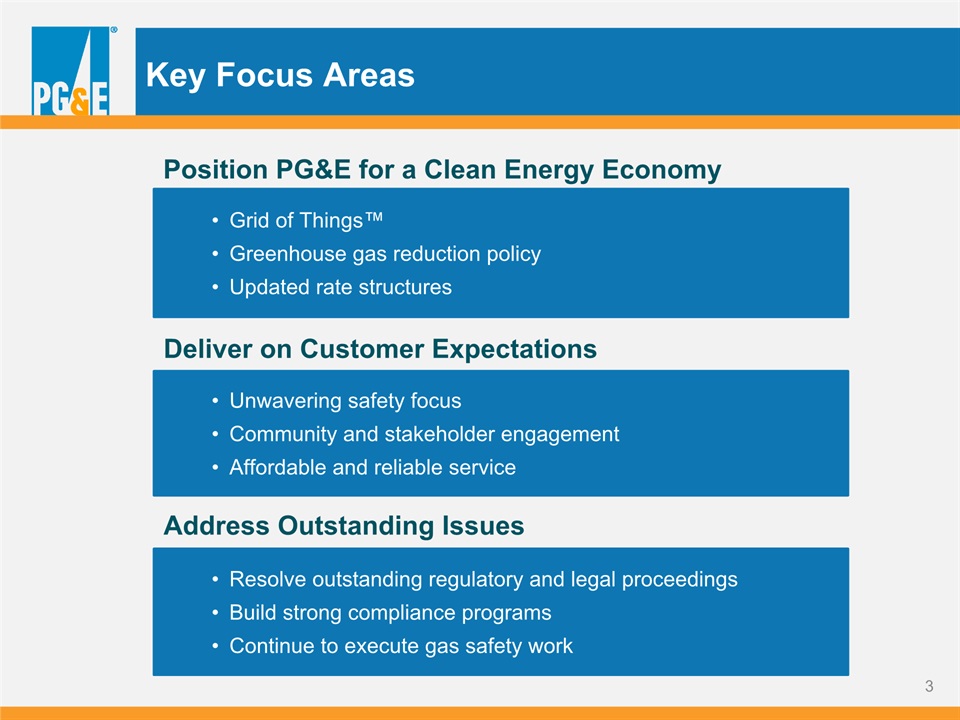
Key Focus Areas Grid of Things™Greenhouse gas reduction policyUpdated rate structures Unwavering safety focusCommunity and stakeholder engagementAffordable and reliable service Resolve outstanding regulatory and legal proceedingsBuild strong compliance programs Continue to execute gas safety work Position PG&E for a Clean Energy Economy Address Outstanding Issues Deliver on Customer Expectations
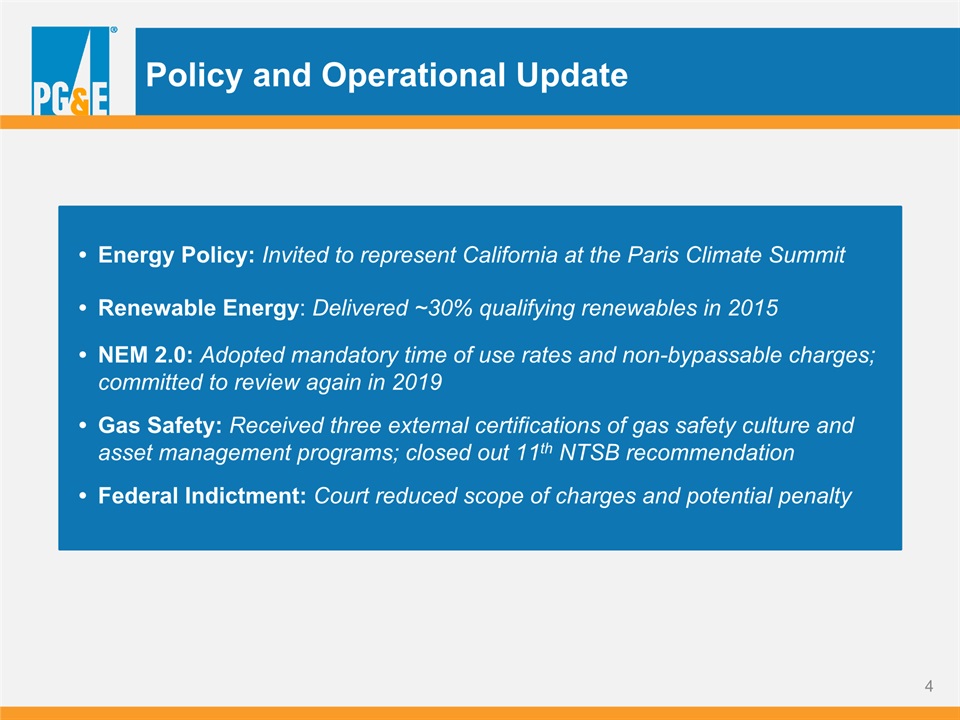
Policy and Operational Update Energy Policy: Invited to represent California at the Paris Climate SummitRenewable Energy: Delivered ~30% qualifying renewables in 2015NEM 2.0: Adopted mandatory time of use rates and non-bypassable charges; committed to review again in 2019Gas Safety: Received three external certifications of gas safety culture and asset management programs; closed out 11th NTSB recommendation Federal Indictment: Court reduced scope of charges and potential penalty
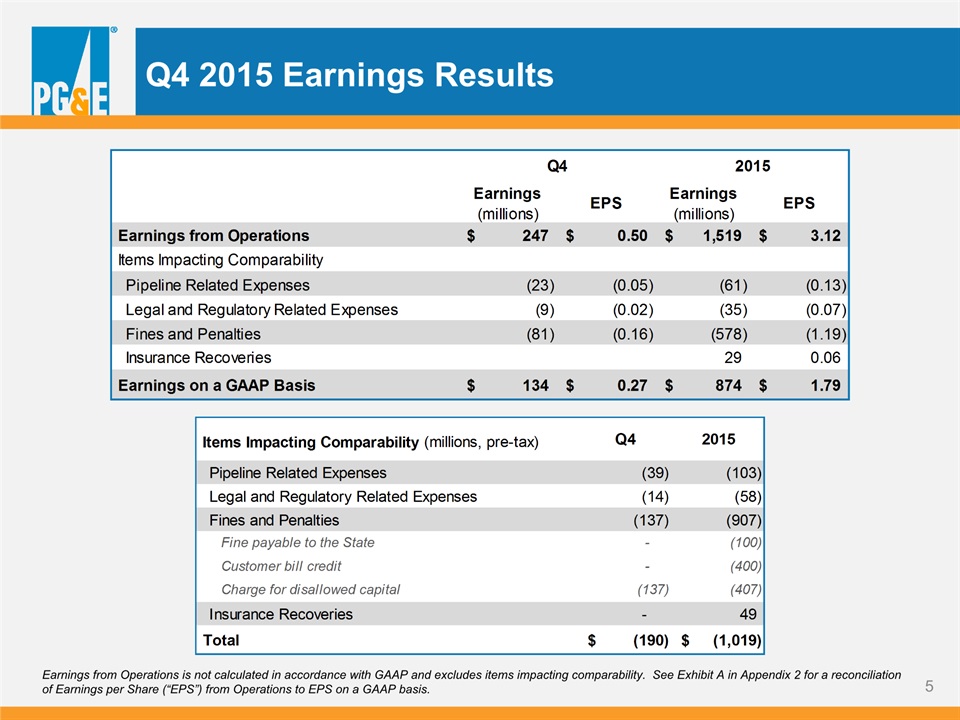
Q4 2015 Earnings Results Earnings from Operations is not calculated in accordance with GAAP and excludes items impacting comparability. See Exhibit A in Appendix 2 for a reconciliation of Earnings per Share (“EPS”) from Operations to EPS on a GAAP basis.
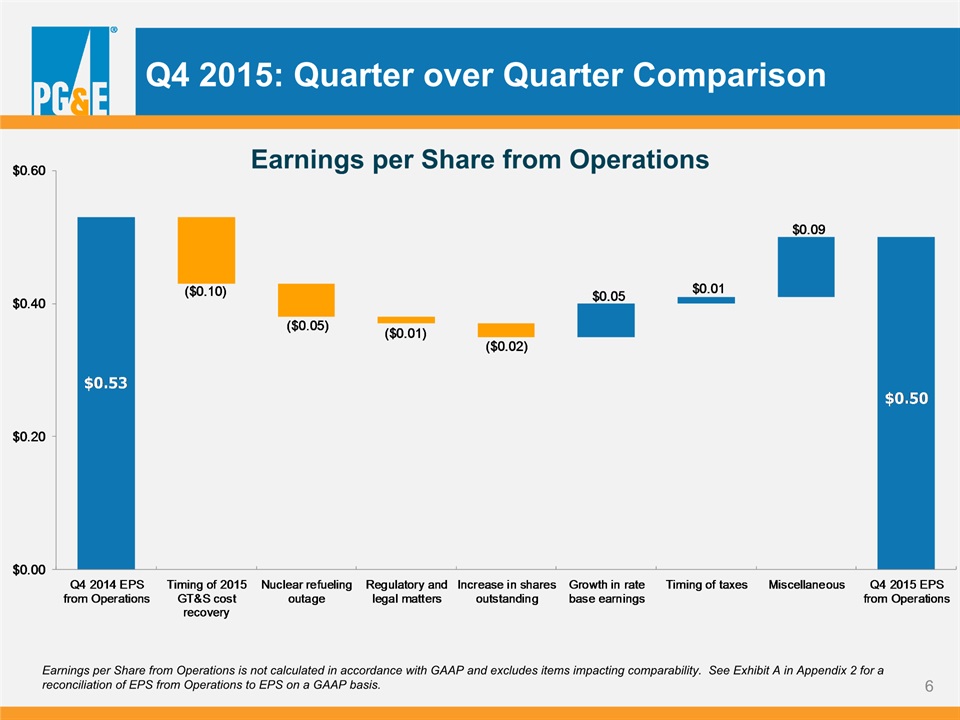
Q4 2015: Quarter over Quarter Comparison Earnings per Share from Operations Earnings per Share from Operations is not calculated in accordance with GAAP and excludes items impacting comparability. See Exhibit A in Appendix 2 for a reconciliation of EPS from Operations to EPS on a GAAP basis.
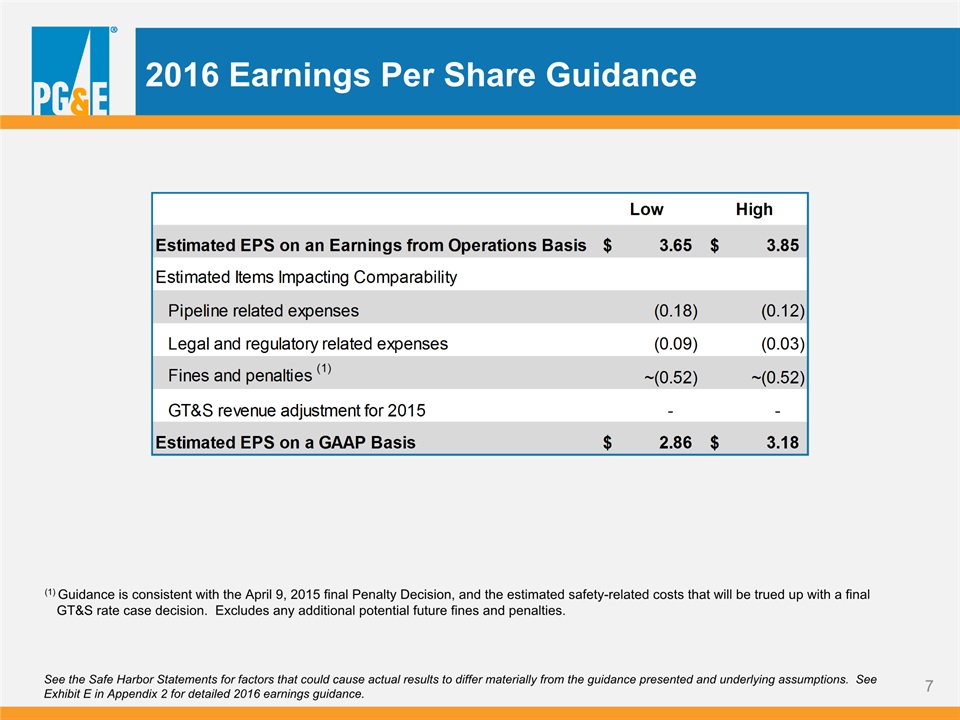
2016 Earnings Per Share Guidance See the Safe Harbor Statements for factors that could cause actual results to differ materially from the guidance presented and underlying assumptions. See Exhibit E in Appendix 2 for detailed 2016 earnings guidance. (1) Guidance is consistent with the April 9, 2015 final Penalty Decision, and the estimated safety-related costs that will be trued up with a final GT&S rate case decision. Excludes any additional potential future fines and penalties.
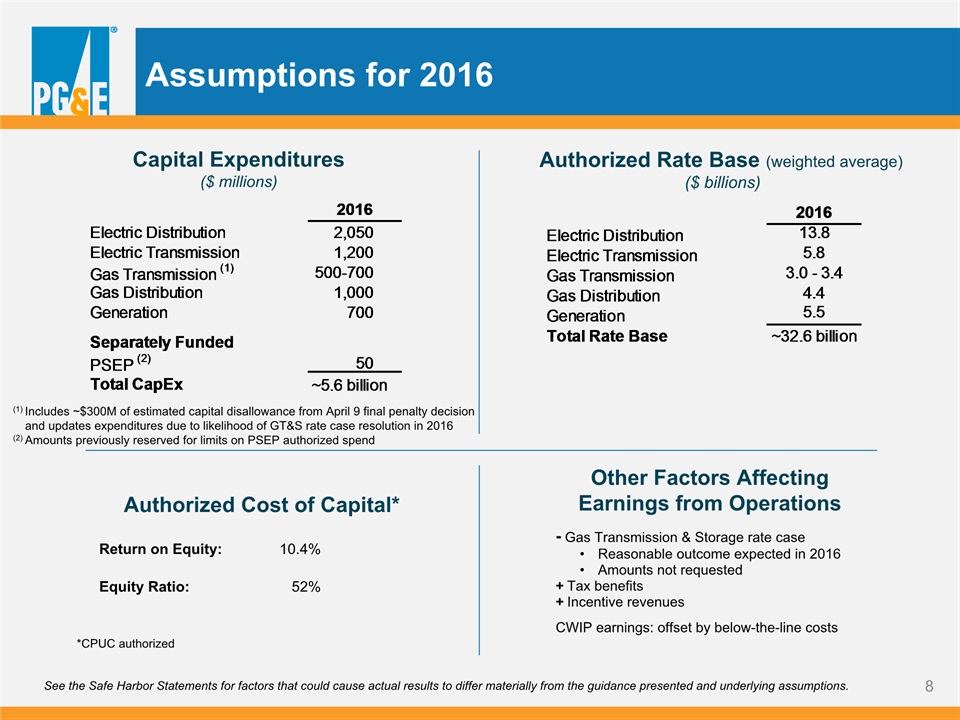
Assumptions for 2016 Return on Equity: 10.4% Equity Ratio: 52% Authorized Cost of Capital* Authorized Rate Base (weighted average) ($ billions) Other Factors Affecting Earnings from Operations - Gas Transmission & Storage rate caseReasonable outcome expected in 2016Amounts not requested+ Tax benefits+ Incentive revenues CWIP earnings: offset by below-the-line costs Capital Expenditures($ millions) (1) Includes ~$300M of estimated capital disallowance from April 9 final penalty decision and updates expenditures due to likelihood of GT&S rate case resolution in 2016(2) Amounts previously reserved for limits on PSEP authorized spend *CPUC authorized See the Safe Harbor Statements for factors that could cause actual results to differ materially from the guidance presented and underlying assumptions.
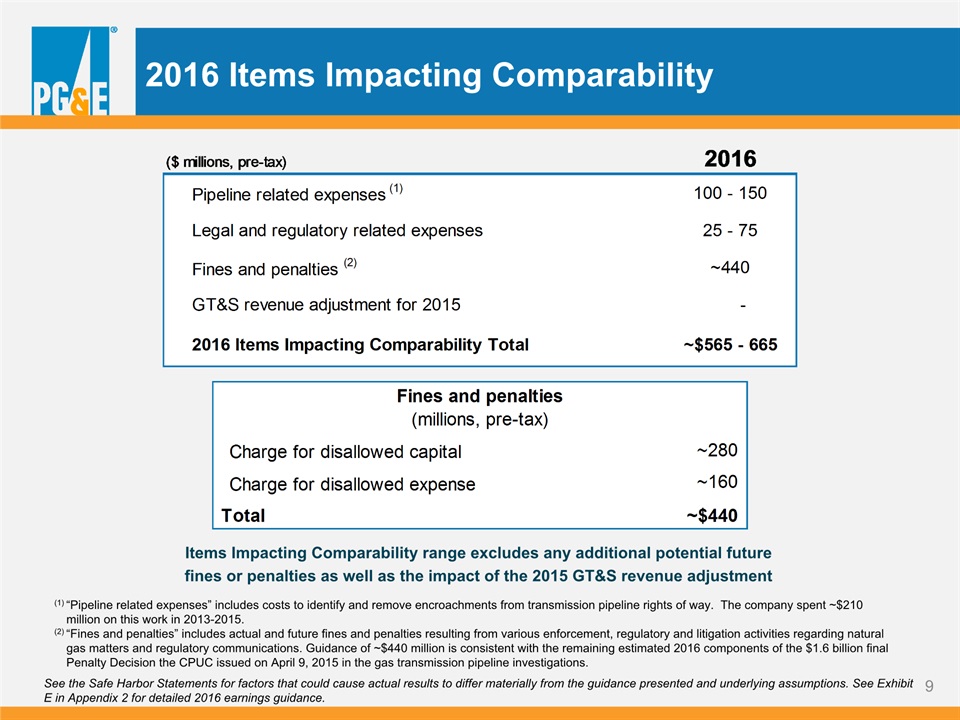
2016 Items Impacting Comparability Items Impacting Comparability range excludes any additional potential futurefines or penalties as well as the impact of the 2015 GT&S revenue adjustment (1) “Pipeline related expenses” includes costs to identify and remove encroachments from transmission pipeline rights of way. The company spent ~$210 million on this work in 2013-2015.(2) “Fines and penalties” includes actual and future fines and penalties resulting from various enforcement, regulatory and litigation activities regarding natural gas matters and regulatory communications. Guidance of ~$440 million is consistent with the remaining estimated 2016 components of the $1.6 billion final Penalty Decision the CPUC issued on April 9, 2015 in the gas transmission pipeline investigations. See the Safe Harbor Statements for factors that could cause actual results to differ materially from the guidance presented and underlying assumptions. See Exhibit E in Appendix 2 for detailed 2016 earnings guidance.
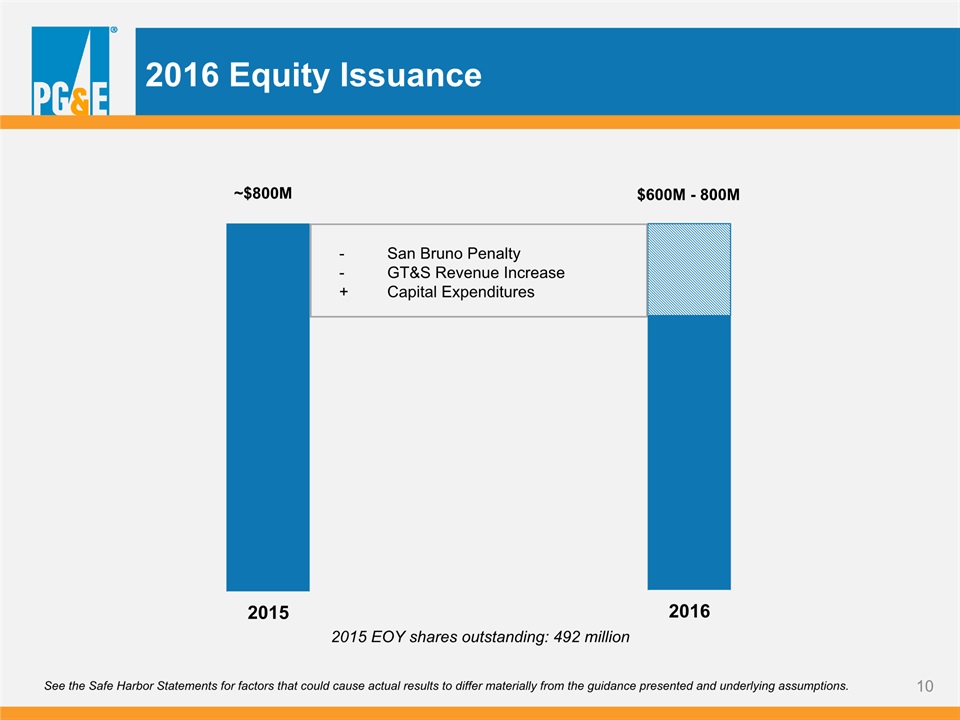
2016 Equity Issuance $600M - 800M 2015 EOY shares outstanding: 492 million 2015 See the Safe Harbor Statements for factors that could cause actual results to differ materially from the guidance presented and underlying assumptions. ~$800M 2016 - San Bruno Penalty- GT&S Revenue Increase+ Capital Expenditures
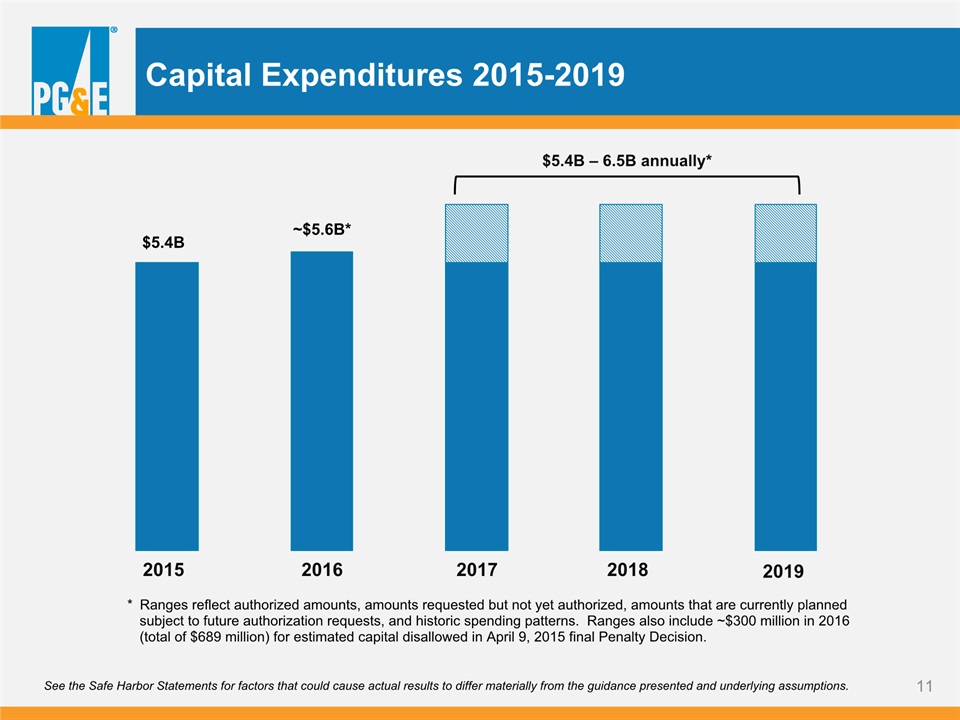
Capital Expenditures 2015-2019 ~$5.6B* See the Safe Harbor Statements for factors that could cause actual results to differ materially from the guidance presented and underlying assumptions. 2019 2016 2017 2018 $5.4B $5.4B – 6.5B annually* * Ranges reflect authorized amounts, amounts requested but not yet authorized, amounts that are currently planned subject to future authorization requests, and historic spending patterns. Ranges also include ~$300 million in 2016 (total of $689 million) for estimated capital disallowed in April 9, 2015 final Penalty Decision. 2015
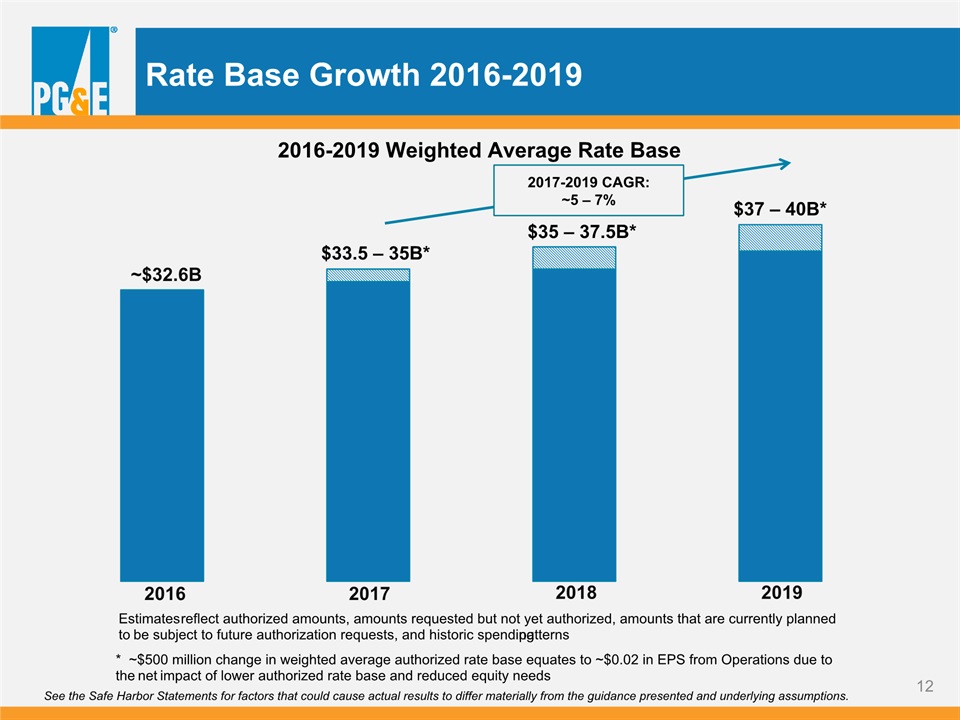
Rate Base Growth 2016-2019 2016-2019 Weighted Average Rate Base Estimates reflect authorized amounts, amounts requested but not yet authorized, amounts that are currently planned to be subject to future authorization requests, and historic spending patterns See the Safe Harbor Statements for factors that could cause actual results to differ materially from the guidance presented and underlying assumptions. $37 – 40B* ~$32.6B $33.5 – 35B* $35 – 37.5B* 2019 2016 2017 2018 2017-2019 CAGR:~5 – 7% * ~$500 million change in weighted average authorized rate base equates to ~$0.02 in EPS from Operations due to the net impact of lower authorized rate base and reduced equity needs
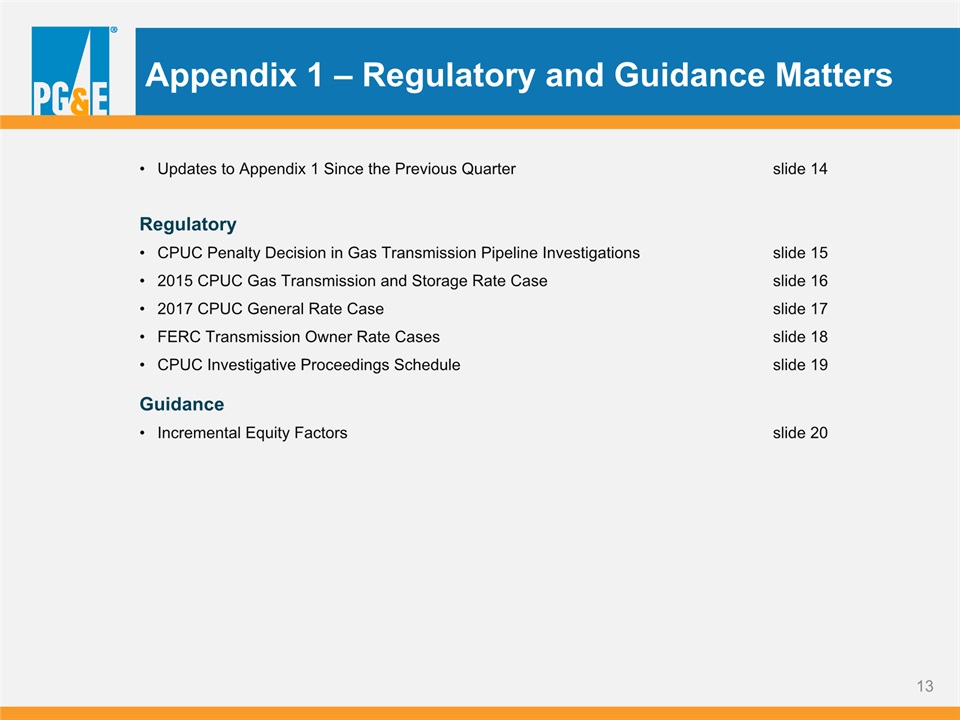
Appendix 1 – Regulatory and Guidance Matters Updates to Appendix 1 Since the Previous Quarter slide 14Regulatory CPUC Penalty Decision in Gas Transmission Pipeline Investigations slide 152015 CPUC Gas Transmission and Storage Rate Case slide 162017 CPUC General Rate Case slide 17FERC Transmission Owner Rate Cases slide 18CPUC Investigative Proceedings Schedule slide 19GuidanceIncremental Equity Factors slide 20
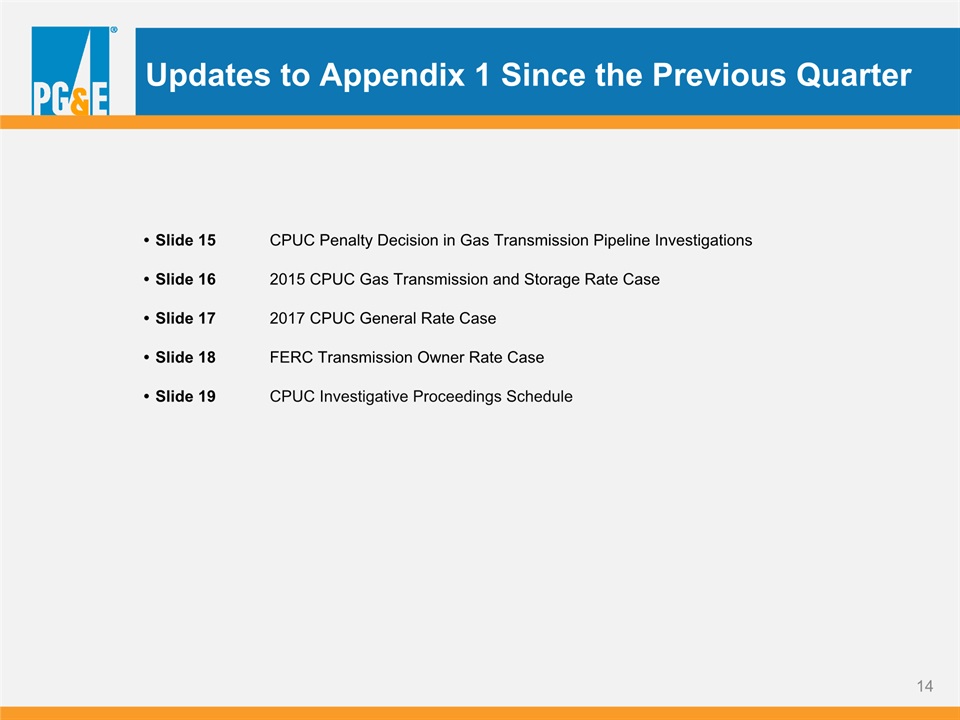
Updates to Appendix 1 Since the Previous Quarter Slide 15 CPUC Penalty Decision in Gas Transmission Pipeline InvestigationsSlide 16 2015 CPUC Gas Transmission and Storage Rate CaseSlide 17 2017 CPUC General Rate CaseSlide 18 FERC Transmission Owner Rate CaseSlide 19 CPUC Investigative Proceedings Schedule
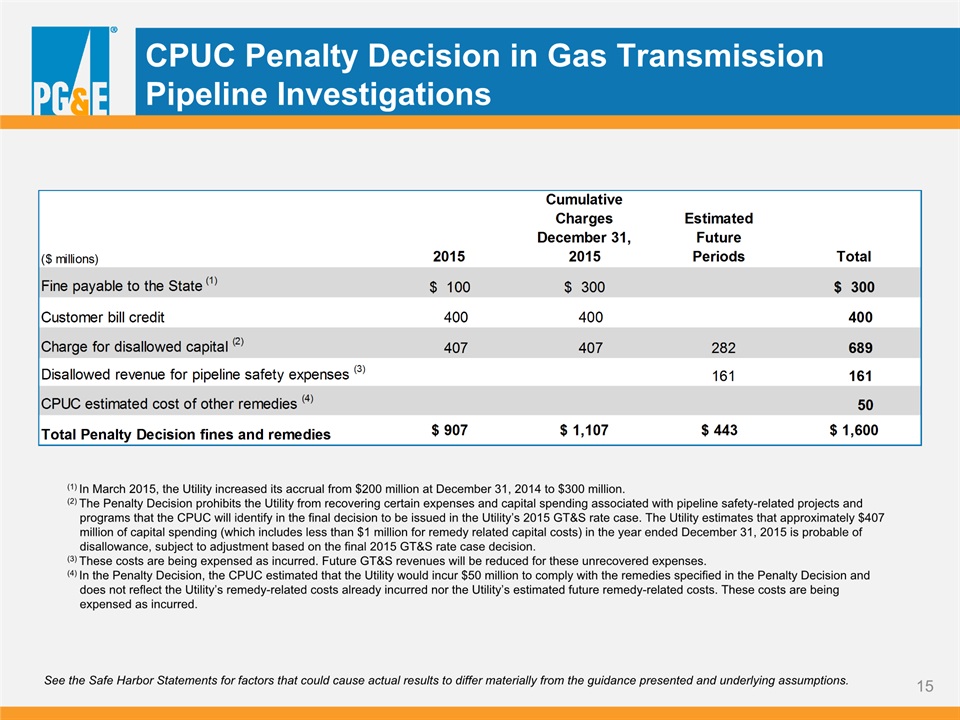
CPUC Penalty Decision in Gas Transmission Pipeline Investigations See the Safe Harbor Statements for factors that could cause actual results to differ materially from the guidance presented and underlying assumptions. (1) In March 2015, the Utility increased its accrual from $200 million at December 31, 2014 to $300 million.(2) The Penalty Decision prohibits the Utility from recovering certain expenses and capital spending associated with pipeline safety-related projects and programs that the CPUC will identify in the final decision to be issued in the Utility’s 2015 GT&S rate case. The Utility estimates that approximately $407 million of capital spending (which includes less than $1 million for remedy related capital costs) in the year ended December 31, 2015 is probable of disallowance, subject to adjustment based on the final 2015 GT&S rate case decision.(3) These costs are being expensed as incurred. Future GT&S revenues will be reduced for these unrecovered expenses.(4) In the Penalty Decision, the CPUC estimated that the Utility would incur $50 million to comply with the remedies specified in the Penalty Decision and does not reflect the Utility’s remedy-related costs already incurred nor the Utility’s estimated future remedy-related costs. These costs are being expensed as incurred.
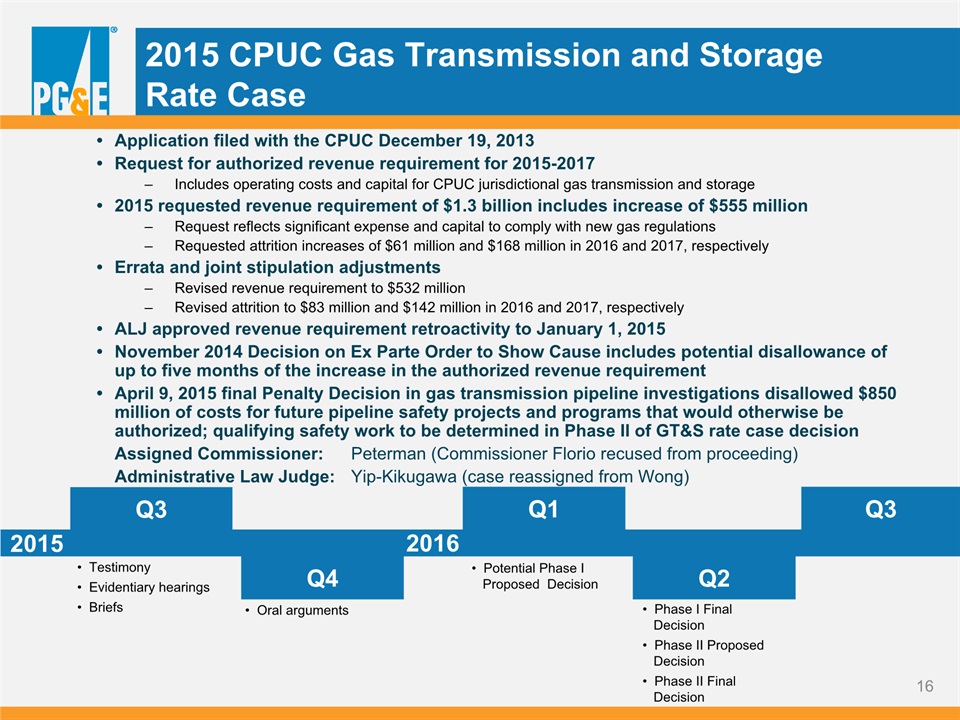
2015 CPUC Gas Transmission and StorageRate Case Application filed with the CPUC December 19, 2013Request for authorized revenue requirement for 2015-2017Includes operating costs and capital for CPUC jurisdictional gas transmission and storage2015 requested revenue requirement of $1.3 billion includes increase of $555 millionRequest reflects significant expense and capital to comply with new gas regulationsRequested attrition increases of $61 million and $168 million in 2016 and 2017, respectively Errata and joint stipulation adjustmentsRevised revenue requirement to $532 millionRevised attrition to $83 million and $142 million in 2016 and 2017, respectivelyALJ approved revenue requirement retroactivity to January 1, 2015November 2014 Decision on Ex Parte Order to Show Cause includes potential disallowance of up to five months of the increase in the authorized revenue requirementApril 9, 2015 final Penalty Decision in gas transmission pipeline investigations disallowed $850 million of costs for future pipeline safety projects and programs that would otherwise be authorized; qualifying safety work to be determined in Phase II of GT&S rate case decision Assigned Commissioner: Peterman (Commissioner Florio recused from proceeding) Administrative Law Judge: Yip-Kikugawa (case reassigned from Wong) Q2 Q4 Q3 Q1 Q3 2015 Oral arguments 2016 Potential Phase I Proposed Decision TestimonyEvidentiary hearingsBriefs Phase I Final DecisionPhase II Proposed DecisionPhase II Final Decision
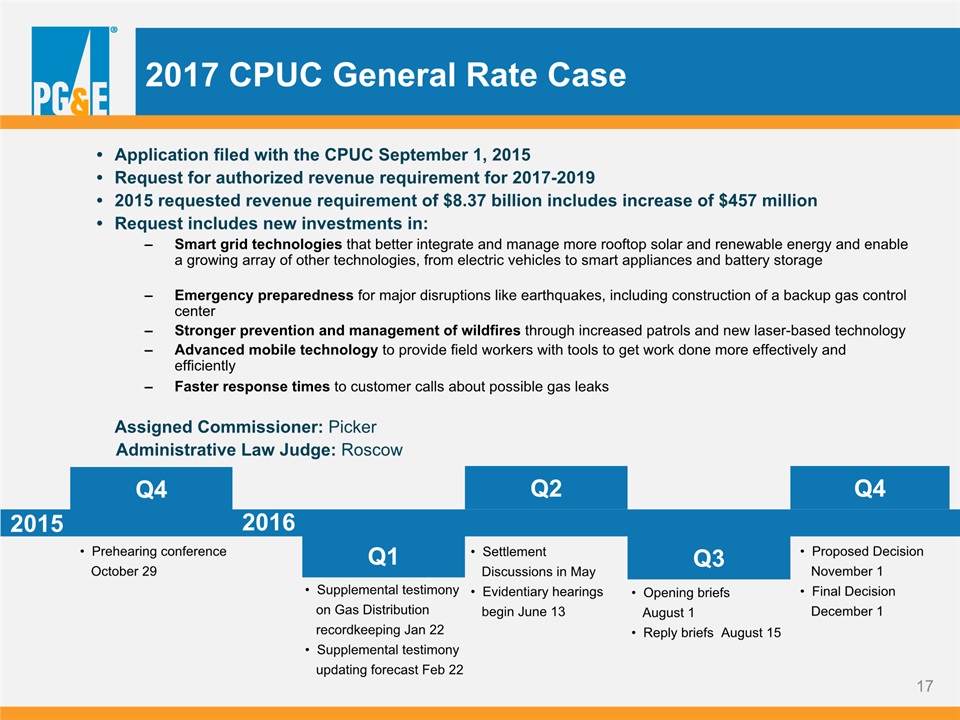
2017 CPUC General Rate Case Application filed with the CPUC September 1, 2015Request for authorized revenue requirement for 2017-20192015 requested revenue requirement of $8.37 billion includes increase of $457 millionRequest includes new investments in:Smart grid technologies that better integrate and manage more rooftop solar and renewable energy and enable a growing array of other technologies, from electric vehicles to smart appliances and battery storage Emergency preparedness for major disruptions like earthquakes, including construction of a backup gas control center Stronger prevention and management of wildfires through increased patrols and new laser-based technologyAdvanced mobile technology to provide field workers with tools to get work done more effectively and efficiently Faster response times to customer calls about possible gas leaks Assigned Commissioner: Picker Administrative Law Judge: Roscow Q3 Q1 Q4 Q2 Q4 2015 Prehearing conference October 29 2016 Supplemental testimony on Gas Distribution recordkeeping Jan 22Supplemental testimony updating forecast Feb 22 Settlement Discussions in MayEvidentiary hearings begin June 13 Opening briefs August 1Reply briefs August 15 Proposed Decision November 1Final Decision December 1
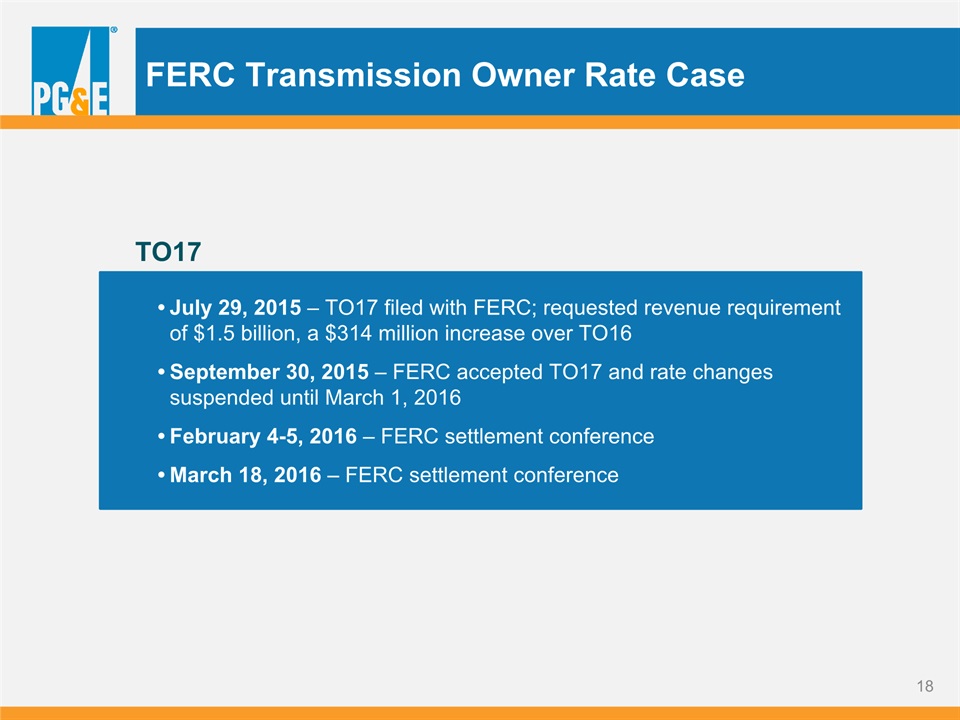
FERC Transmission Owner Rate Case July 29, 2015 – TO17 filed with FERC; requested revenue requirement of $1.5 billion, a $314 million increase over TO16September 30, 2015 – FERC accepted TO17 and rate changes suspended until March 1, 2016February 4-5, 2016 – FERC settlement conferenceMarch 18, 2016 – FERC settlement conference TO17
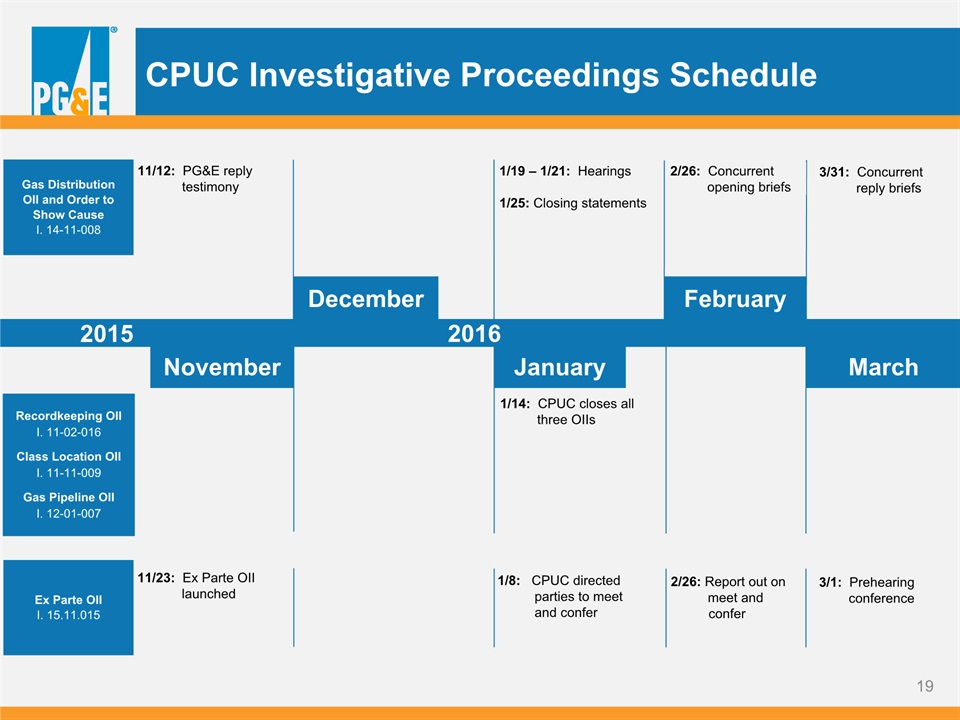
CPUC Investigative Proceedings Schedule Recordkeeping OIII. 11-02-016Class Location OIII. 11-11-009Gas Pipeline OIII. 12-01-007 February January March 2015 Ex Parte OIII. 15.11.015 Gas DistributionOII and Order toShow Cause I. 14-11-008 December November 1/19 – 1/21: Hearings 1/25: Closing statements 2016 2/26: Concurrent opening briefs 3/31: Concurrent reply briefs 1/14: CPUC closes all three OIIs 1/8: CPUC directed parties to meet and confer 2/26: Report out on meet and confer 11/12: PG&E reply testimony 11/23: Ex Parte OII launched 3/1: Prehearing conference
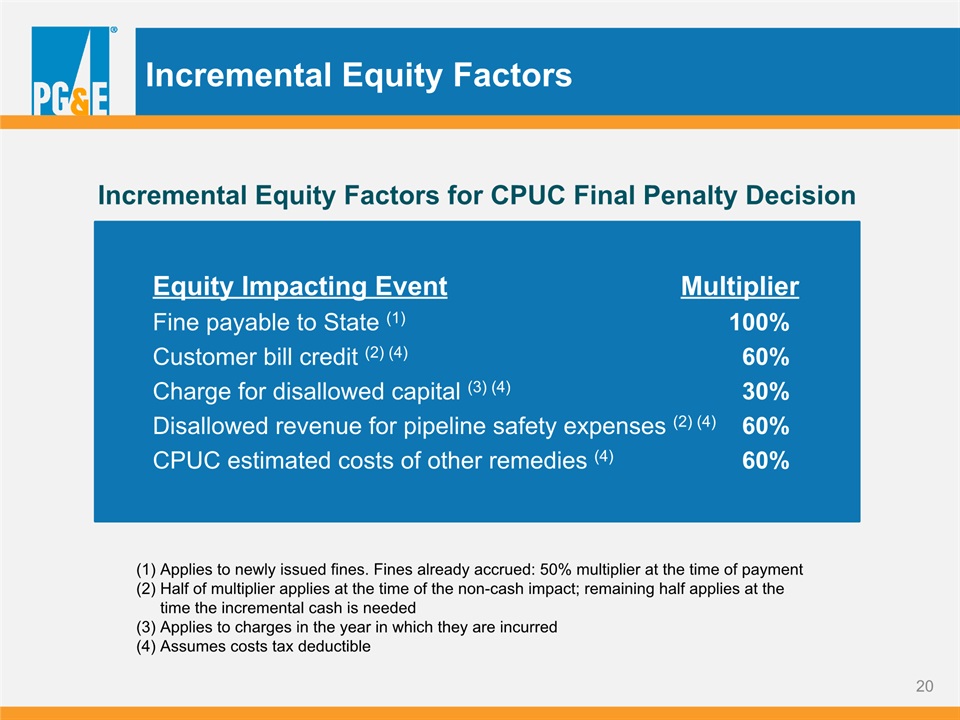
Incremental Equity Factors Equity Impacting Event MultiplierFine payable to State (1) 100%Customer bill credit (2) (4) 60%Charge for disallowed capital (3) (4) 30%Disallowed revenue for pipeline safety expenses (2) (4) 60%CPUC estimated costs of other remedies (4) 60% Applies to newly issued fines. Fines already accrued: 50% multiplier at the time of paymentHalf of multiplier applies at the time of the non-cash impact; remaining half applies at the time the incremental cash is neededApplies to charges in the year in which they are incurredAssumes costs tax deductible Incremental Equity Factors for CPUC Final Penalty Decision
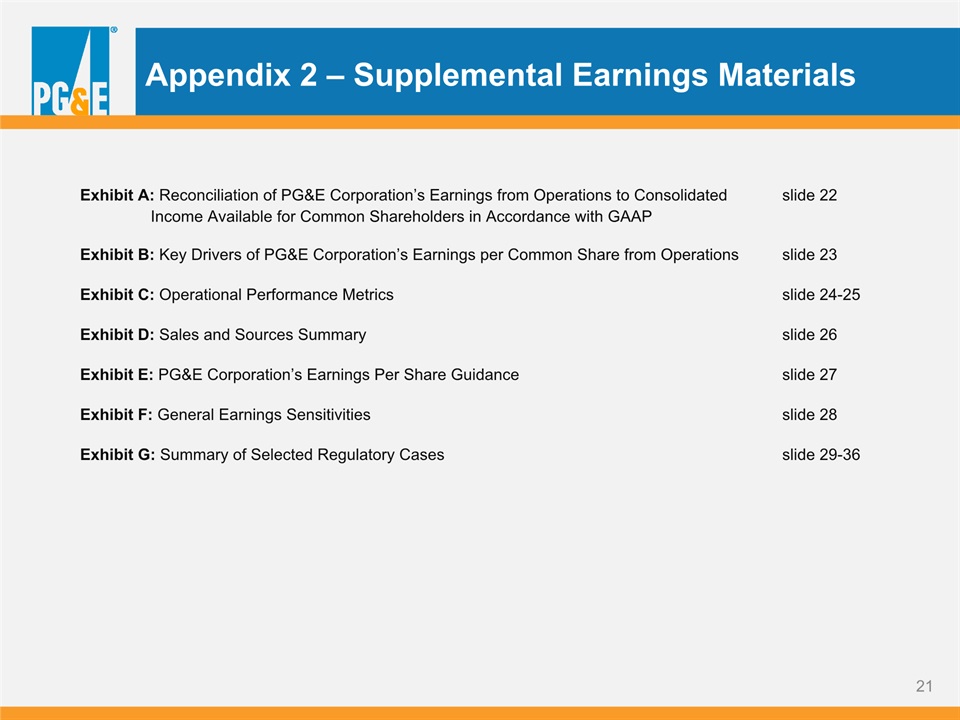
Appendix 2 – Supplemental Earnings Materials Exhibit A: Reconciliation of PG&E Corporation’s Earnings from Operations to Consolidated slide 22 Income Available for Common Shareholders in Accordance with GAAP Exhibit B: Key Drivers of PG&E Corporation’s Earnings per Common Share from Operations slide 23Exhibit C: Operational Performance Metrics slide 24-25 Exhibit D: Sales and Sources Summary slide 26Exhibit E: PG&E Corporation’s Earnings Per Share Guidance slide 27 Exhibit F: General Earnings Sensitivities slide 28Exhibit G: Summary of Selected Regulatory Cases slide 29-36
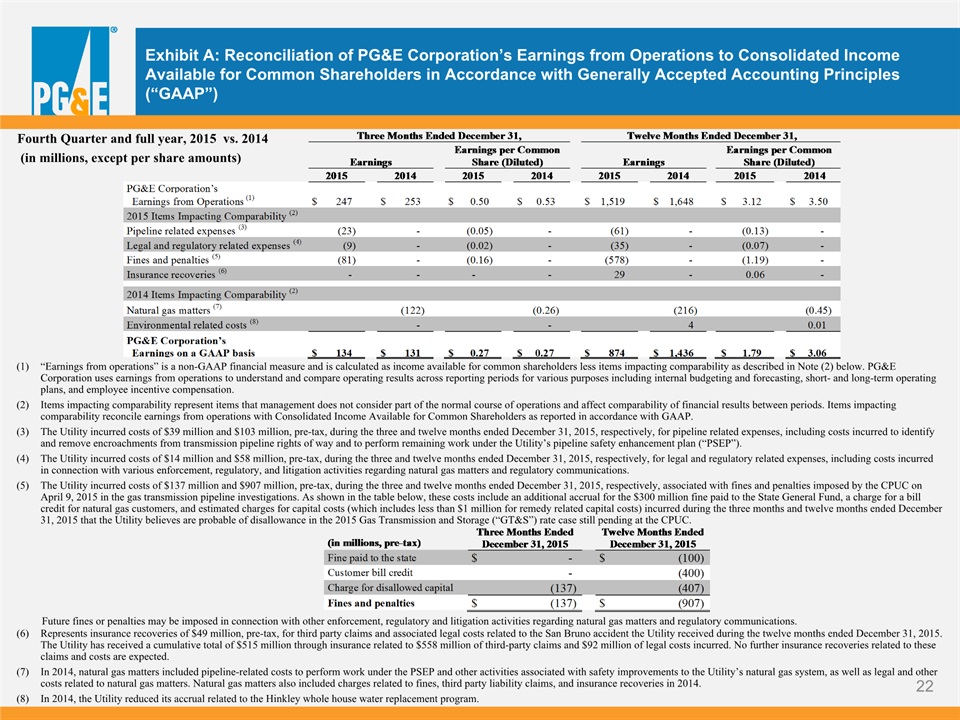
Exhibit A: Reconciliation of PG&E Corporation’s Earnings from Operations to Consolidated Income Available for Common Shareholders in Accordance with Generally Accepted Accounting Principles (“GAAP”) Fourth Quarter and full year, 2015 vs. 2014 (in millions, except per share amounts) Represents insurance recoveries of $49 million, pre-tax, for third party claims and associated legal costs related to the San Bruno accident the Utility received during the twelve months ended December 31, 2015. The Utility has received a cumulative total of $515 million through insurance related to $558 million of third-party claims and $92 million of legal costs incurred. No further insurance recoveries related to these claims and costs are expected.In 2014, natural gas matters included pipeline-related costs to perform work under the PSEP and other activities associated with safety improvements to the Utility’s natural gas system, as well as legal and other costs related to natural gas matters. Natural gas matters also included charges related to fines, third party liability claims, and insurance recoveries in 2014.In 2014, the Utility reduced its accrual related to the Hinkley whole house water replacement program. “Earnings from operations” is a non-GAAP financial measure and is calculated as income available for common shareholders less items impacting comparability as described in Note (2) below. PG&E Corporation uses earnings from operations to understand and compare operating results across reporting periods for various purposes including internal budgeting and forecasting, short- and long-term operating plans, and employee incentive compensation.Items impacting comparability represent items that management does not consider part of the normal course of operations and affect comparability of financial results between periods. Items impacting comparability reconcile earnings from operations with Consolidated Income Available for Common Shareholders as reported in accordance with GAAP. The Utility incurred costs of $39 million and $103 million, pre-tax, during the three and twelve months ended December 31, 2015, respectively, for pipeline related expenses, including costs incurred to identify and remove encroachments from transmission pipeline rights of way and to perform remaining work under the Utility’s pipeline safety enhancement plan (“PSEP”).The Utility incurred costs of $14 million and $58 million, pre-tax, during the three and twelve months ended December 31, 2015, respectively, for legal and regulatory related expenses, including costs incurred in connection with various enforcement, regulatory, and litigation activities regarding natural gas matters and regulatory communications. The Utility incurred costs of $137 million and $907 million, pre-tax, during the three and twelve months ended December 31, 2015, respectively, associated with fines and penalties imposed by the CPUC on April 9, 2015 in the gas transmission pipeline investigations. As shown in the table below, these costs include an additional accrual for the $300 million fine paid to the State General Fund, a charge for a bill credit for natural gas customers, and estimated charges for capital costs (which includes less than $1 million for remedy related capital costs) incurred during the three months and twelve months ended December 31, 2015 that the Utility believes are probable of disallowance in the 2015 Gas Transmission and Storage (“GT&S”) rate case still pending at the CPUC. Future fines or penalties may be imposed in connection with other enforcement, regulatory and litigation activities regarding natural gas matters and regulatory communications.
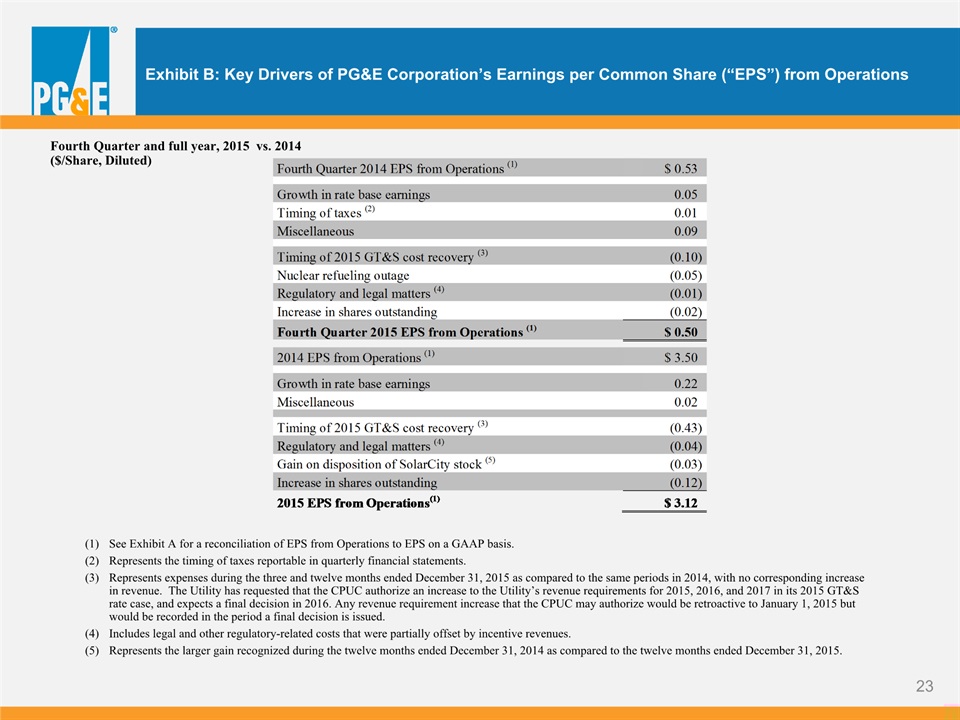
Exhibit B: Key Drivers of PG&E Corporation’s Earnings per Common Share (“EPS”) from Operations Fourth Quarter and full year, 2015 vs. 2014($/Share, Diluted) See Exhibit A for a reconciliation of EPS from Operations to EPS on a GAAP basis.Represents the timing of taxes reportable in quarterly financial statements.Represents expenses during the three and twelve months ended December 31, 2015 as compared to the same periods in 2014, with no corresponding increase in revenue. The Utility has requested that the CPUC authorize an increase to the Utility’s revenue requirements for 2015, 2016, and 2017 in its 2015 GT&S rate case, and expects a final decision in 2016. Any revenue requirement increase that the CPUC may authorize would be retroactive to January 1, 2015 but would be recorded in the period a final decision is issued.Includes legal and other regulatory-related costs that were partially offset by incentive revenues.Represents the larger gain recognized during the twelve months ended December 31, 2014 as compared to the twelve months ended December 31, 2015.
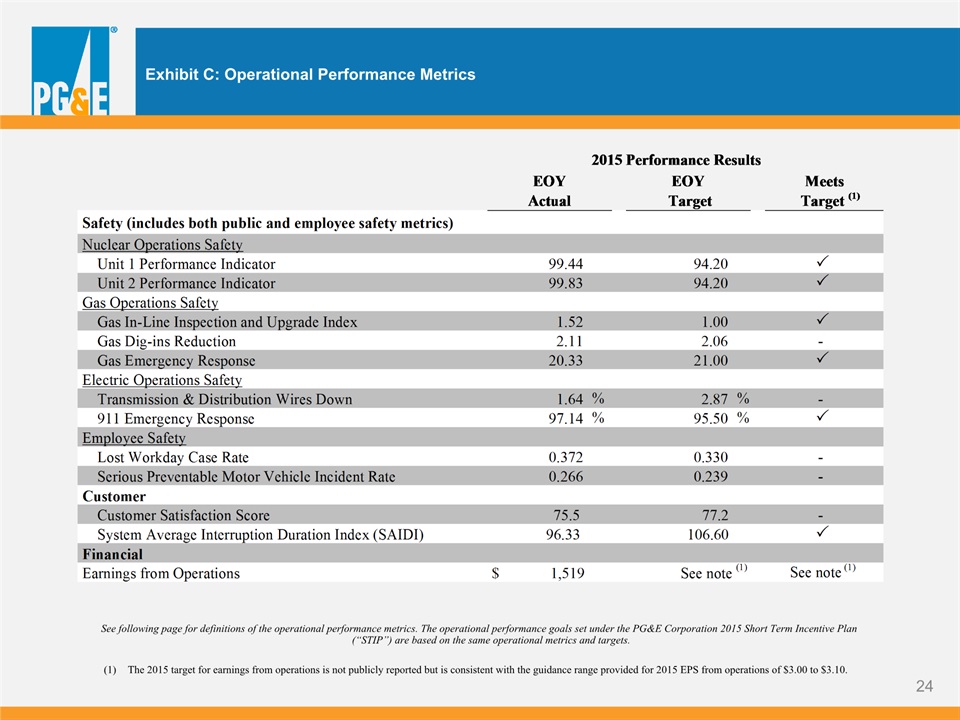
Exhibit C: Operational Performance Metrics The 2015 target for earnings from operations is not publicly reported but is consistent with the guidance range provided for 2015 EPS from operations of $3.00 to $3.10. See following page for definitions of the operational performance metrics. The operational performance goals set under the PG&E Corporation 2015 Short Term Incentive Plan (“STIP”) are based on the same operational metrics and targets.
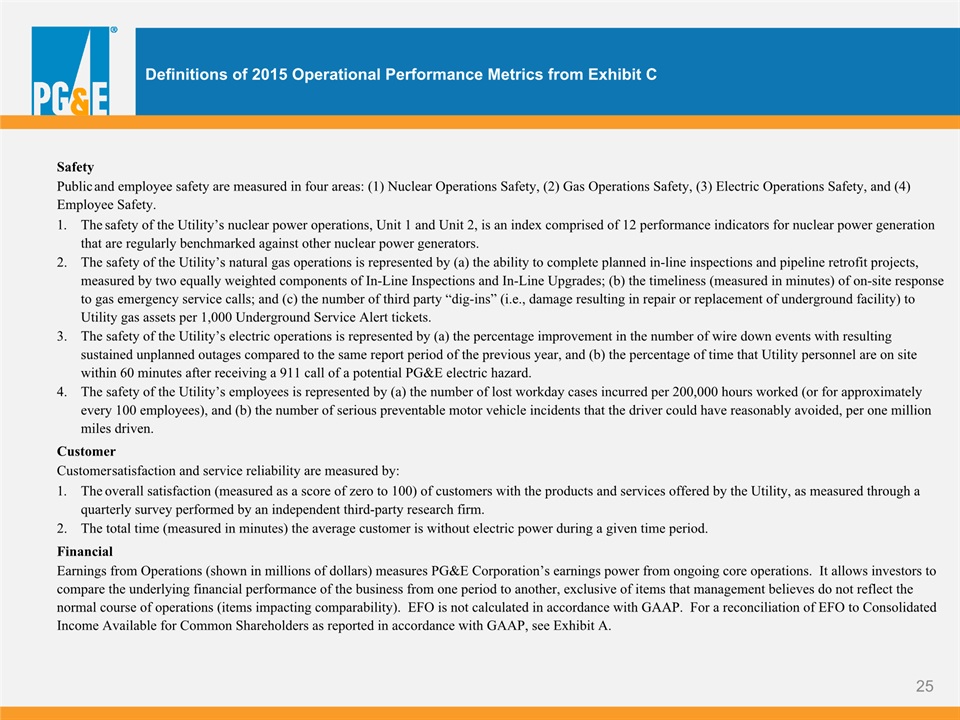
Definitions of 2015 Operational Performance Metrics from Exhibit C SafetyPublic and employee safety are measured in four areas: (1) Nuclear Operations Safety, (2) Gas Operations Safety, (3) Electric Operations Safety, and (4) Employee Safety.1. The safety of the Utility’s nuclear power operations, Unit 1 and Unit 2, is an index comprised of 12 performance indicators for nuclear power generation that are regularly benchmarked against other nuclear power generators. 2. The safety of the Utility’s natural gas operations is represented by (a) the ability to complete planned in-line inspections and pipeline retrofit projects, measured by two equally weighted components of In-Line Inspections and In-Line Upgrades; (b) the timeliness (measured in minutes) of on-site response to gas emergency service calls; and (c) the number of third party “dig-ins” (i.e., damage resulting in repair or replacement of underground facility) to Utility gas assets per 1,000 Underground Service Alert tickets.3. The safety of the Utility’s electric operations is represented by (a) the percentage improvement in the number of wire down events with resulting sustained unplanned outages compared to the same report period of the previous year, and (b) the percentage of time that Utility personnel are on site within 60 minutes after receiving a 911 call of a potential PG&E electric hazard.4. The safety of the Utility’s employees is represented by (a) the number of lost workday cases incurred per 200,000 hours worked (or for approximately every 100 employees), and (b) the number of serious preventable motor vehicle incidents that the driver could have reasonably avoided, per one million miles driven.CustomerCustomer satisfaction and service reliability are measured by:1. The overall satisfaction (measured as a score of zero to 100) of customers with the products and services offered by the Utility, as measured through a quarterly survey performed by an independent third-party research firm.2. The total time (measured in minutes) the average customer is without electric power during a given time period.FinancialEarnings from Operations (shown in millions of dollars) measures PG&E Corporation’s earnings power from ongoing core operations. It allows investors to compare the underlying financial performance of the business from one period to another, exclusive of items that management believes do not reflect the normal course of operations (items impacting comparability). EFO is not calculated in accordance with GAAP. For a reconciliation of EFO to Consolidated Income Available for Common Shareholders as reported in accordance with GAAP, see Exhibit A.
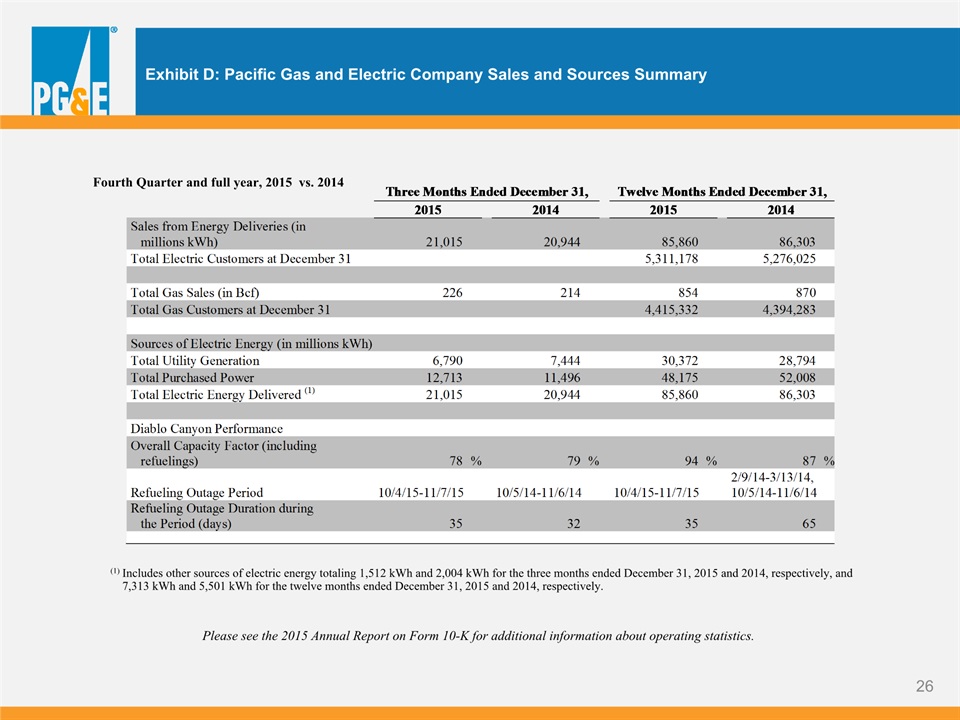
(1) Includes other sources of electric energy totaling 1,512 kWh and 2,004 kWh for the three months ended December 31, 2015 and 2014, respectively, and 7,313 kWh and 5,501 kWh for the twelve months ended December 31, 2015 and 2014, respectively. Exhibit D: Pacific Gas and Electric Company Sales and Sources Summary Fourth Quarter and full year, 2015 vs. 2014 Please see the 2015 Annual Report on Form 10-K for additional information about operating statistics.
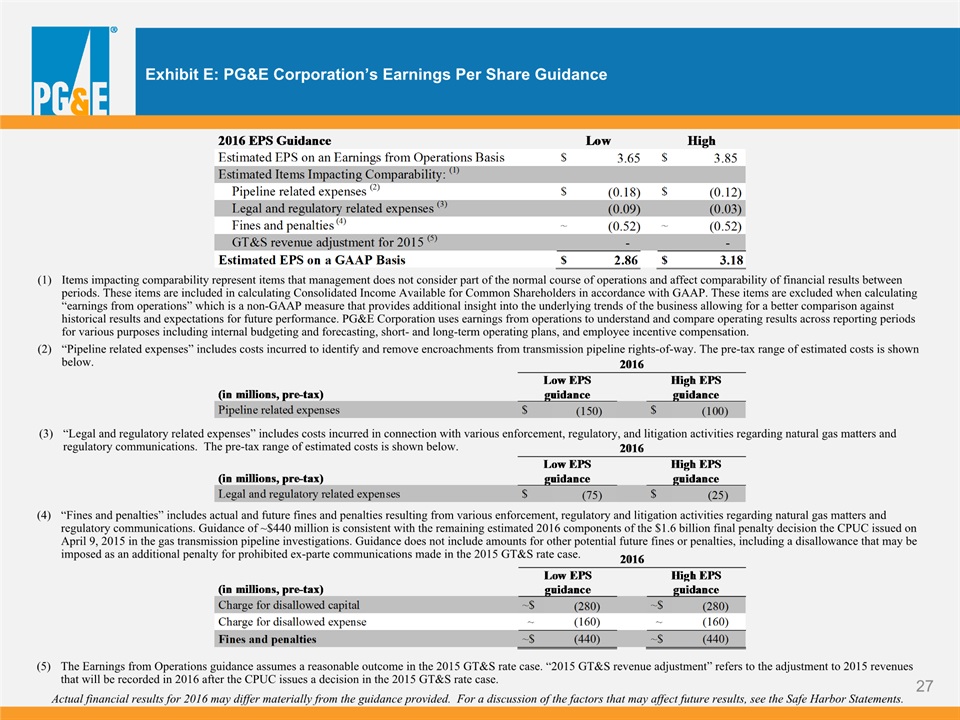
Exhibit E: PG&E Corporation’s Earnings Per Share Guidance Items impacting comparability represent items that management does not consider part of the normal course of operations and affect comparability of financial results between periods. These items are included in calculating Consolidated Income Available for Common Shareholders in accordance with GAAP. These items are excluded when calculating “earnings from operations” which is a non-GAAP measure that provides additional insight into the underlying trends of the business allowing for a better comparison against historical results and expectations for future performance. PG&E Corporation uses earnings from operations to understand and compare operating results across reporting periods for various purposes including internal budgeting and forecasting, short- and long-term operating plans, and employee incentive compensation.“Pipeline related expenses” includes costs incurred to identify and remove encroachments from transmission pipeline rights-of-way. The pre-tax range of estimated costs is shown below. (3) “Legal and regulatory related expenses” includes costs incurred in connection with various enforcement, regulatory, and litigation activities regarding natural gas matters and regulatory communications. The pre-tax range of estimated costs is shown below. Actual financial results for 2016 may differ materially from the guidance provided. For a discussion of the factors that may affect future results, see the Safe Harbor Statements. (4) “Fines and penalties” includes actual and future fines and penalties resulting from various enforcement, regulatory and litigation activities regarding natural gas matters and regulatory communications. Guidance of ~$440 million is consistent with the remaining estimated 2016 components of the $1.6 billion final penalty decision the CPUC issued on April 9, 2015 in the gas transmission pipeline investigations. Guidance does not include amounts for other potential future fines or penalties, including a disallowance that may be imposed as an additional penalty for prohibited ex-parte communications made in the 2015 GT&S rate case. (5) The Earnings from Operations guidance assumes a reasonable outcome in the 2015 GT&S rate case. “2015 GT&S revenue adjustment” refers to the adjustment to 2015 revenues that will be recorded in 2016 after the CPUC issues a decision in the 2015 GT&S rate case.
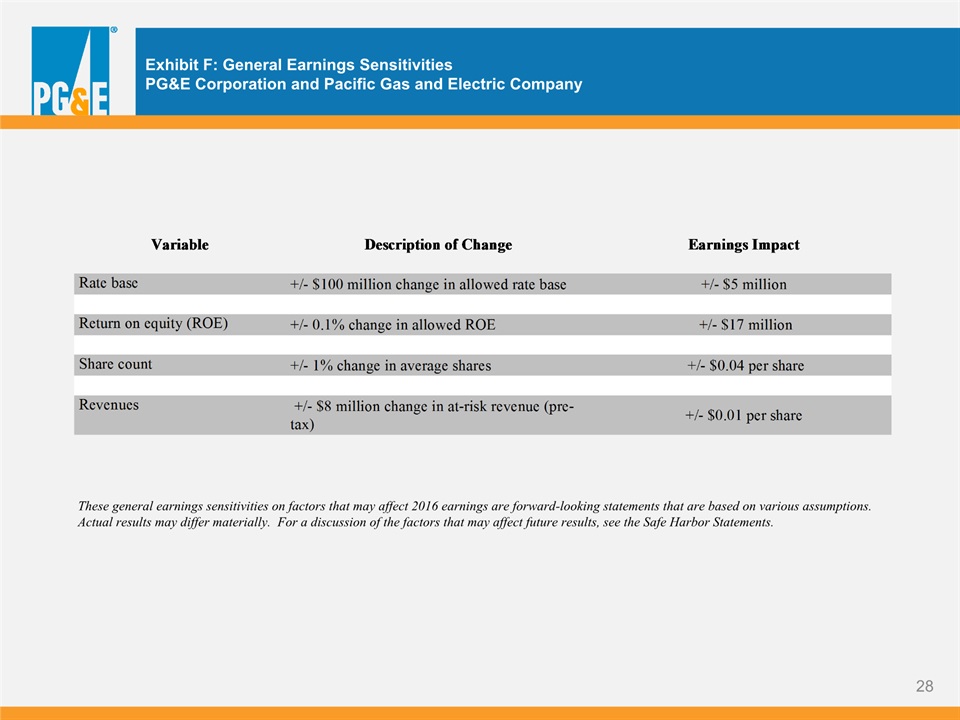
Exhibit F: General Earnings SensitivitiesPG&E Corporation and Pacific Gas and Electric Company These general earnings sensitivities on factors that may affect 2016 earnings are forward-looking statements that are based on various assumptions. Actual results may differ materially. For a discussion of the factors that may affect future results, see the Safe Harbor Statements.
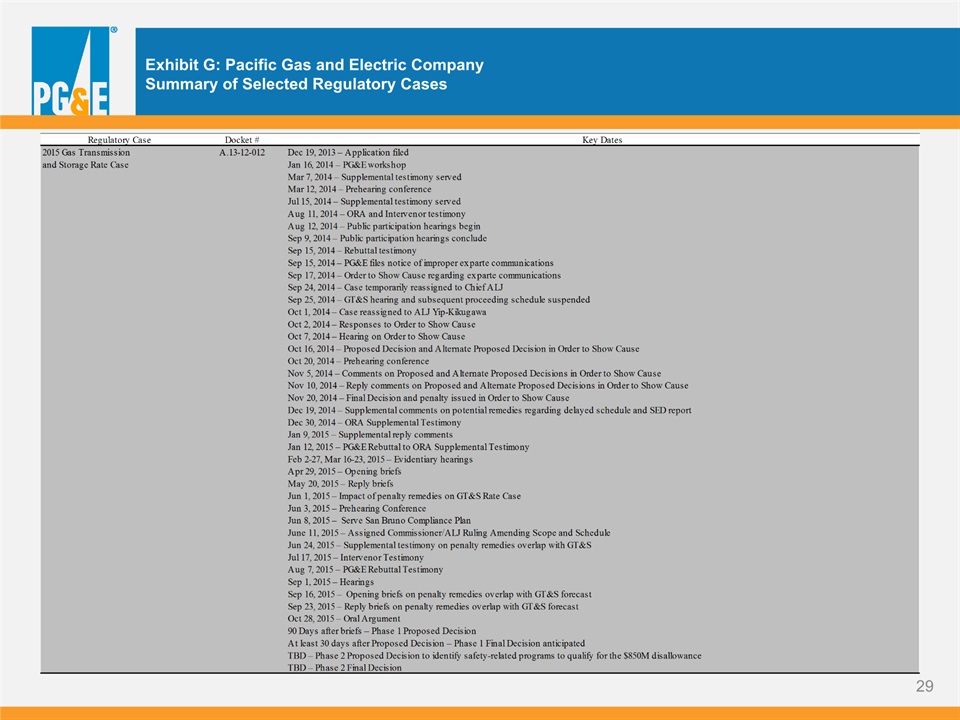
Exhibit G: Pacific Gas and Electric CompanySummary of Selected Regulatory Cases
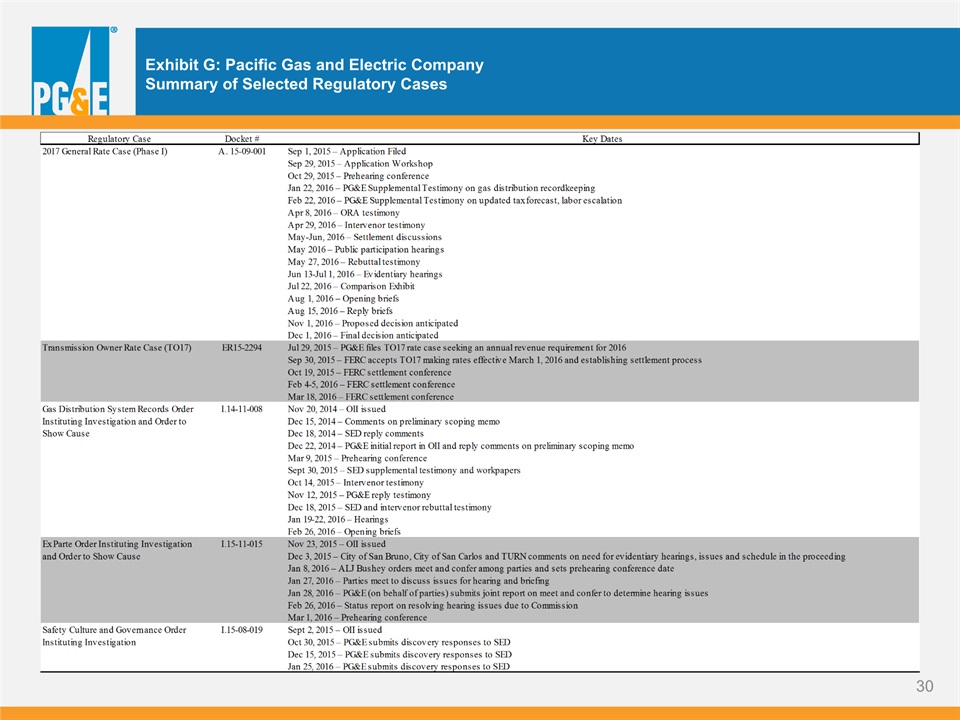
Exhibit G: Pacific Gas and Electric CompanySummary of Selected Regulatory Cases
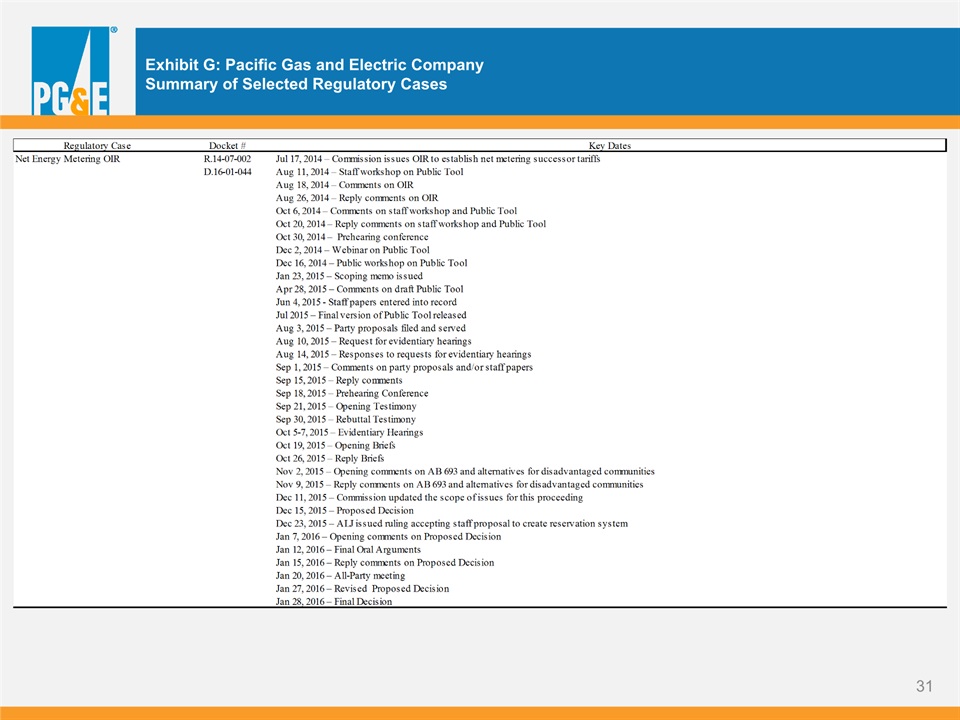
Exhibit G: Pacific Gas and Electric CompanySummary of Selected Regulatory Cases
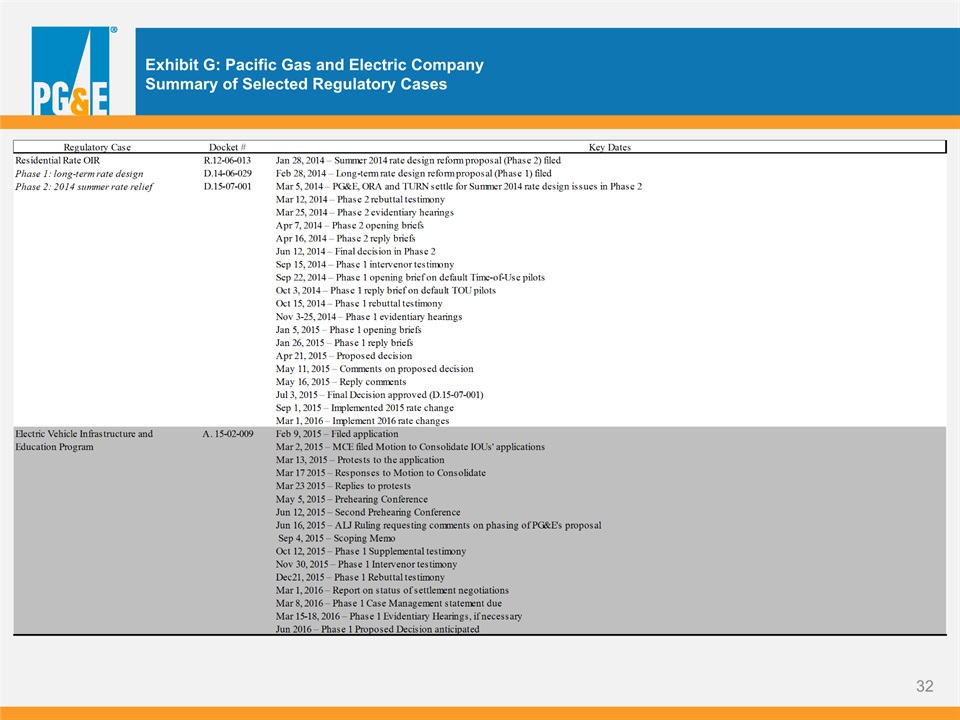
Exhibit G: Pacific Gas and Electric CompanySummary of Selected Regulatory Cases
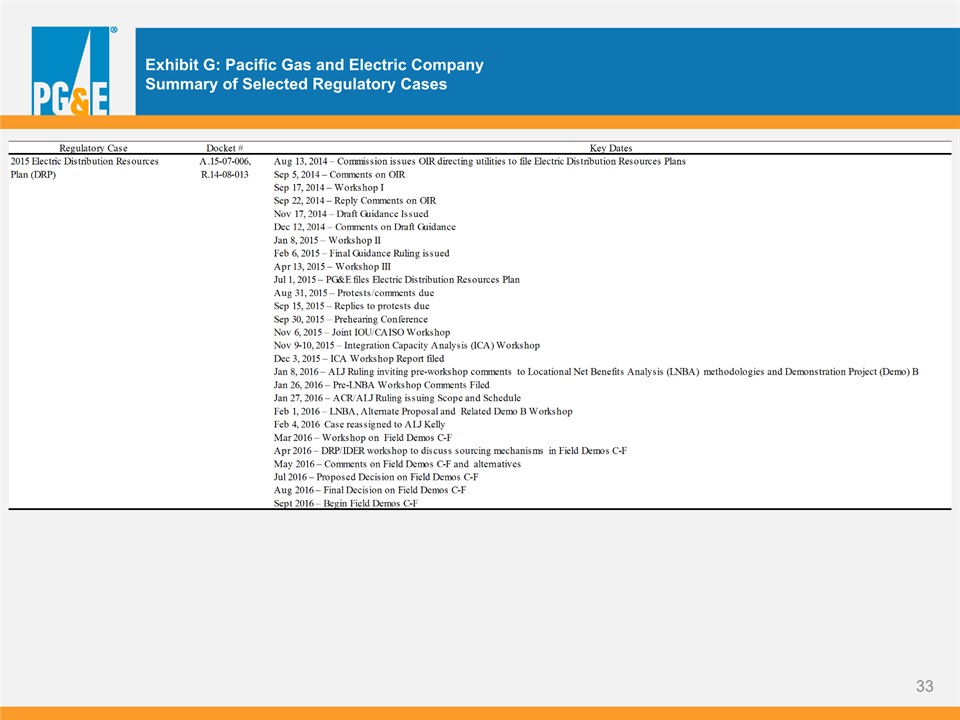
Exhibit G: Pacific Gas and Electric CompanySummary of Selected Regulatory Cases
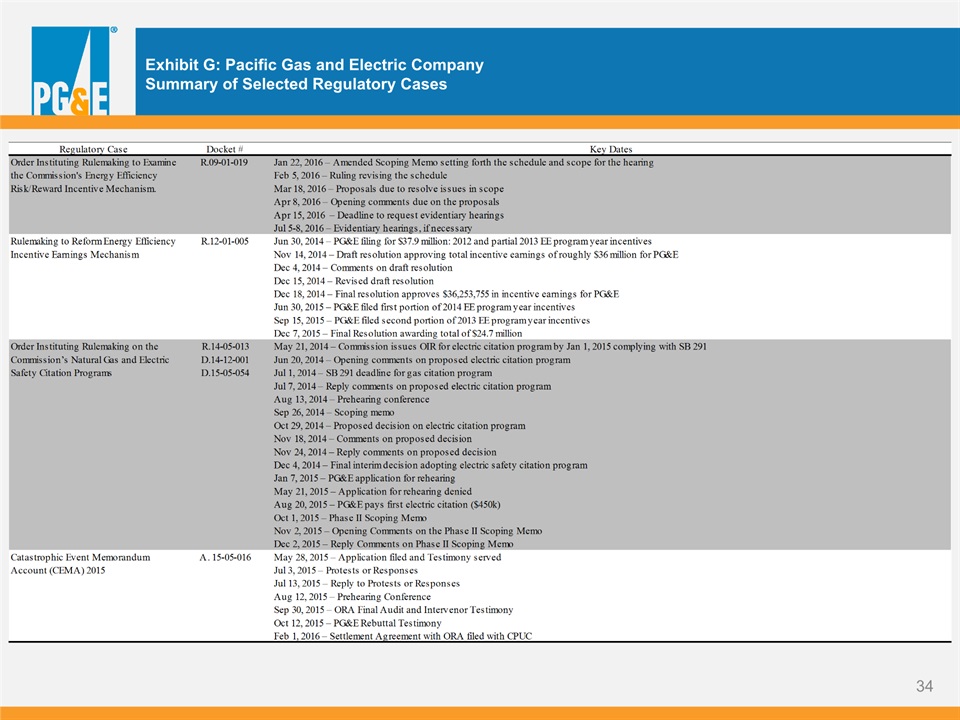
Exhibit G: Pacific Gas and Electric CompanySummary of Selected Regulatory Cases
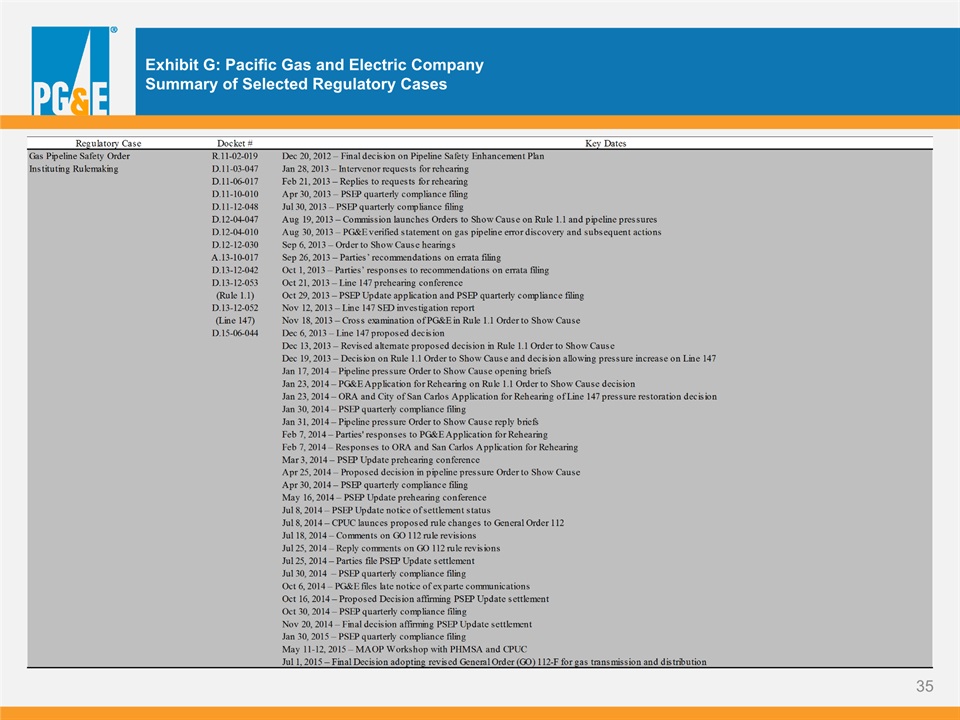
Exhibit G: Pacific Gas and Electric CompanySummary of Selected Regulatory Cases
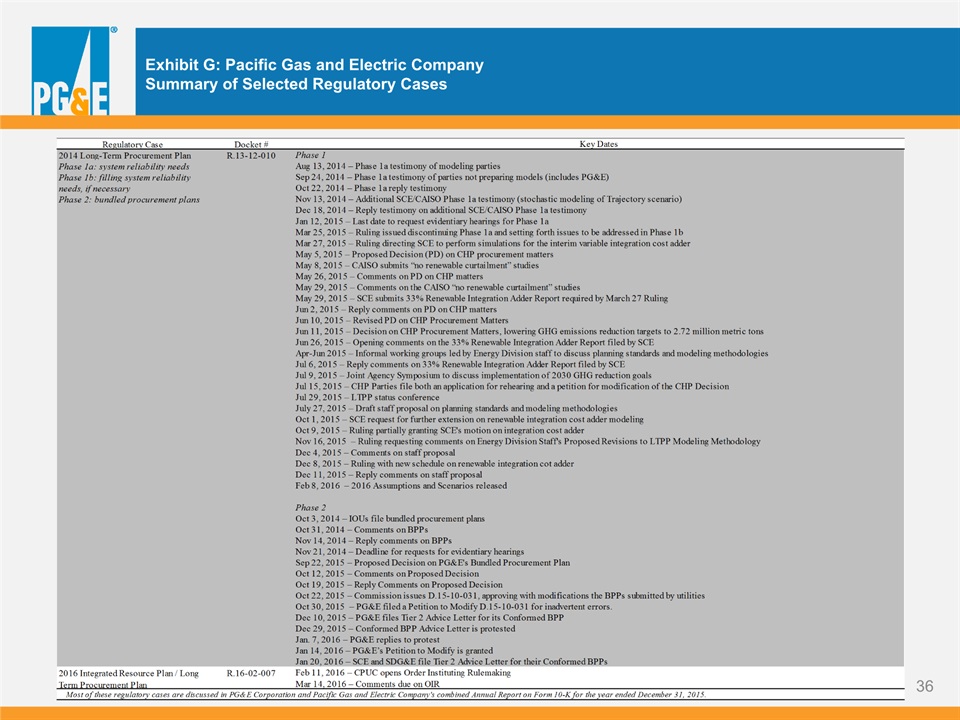
Exhibit G: Pacific Gas and Electric CompanySummary of Selected Regulatory Cases